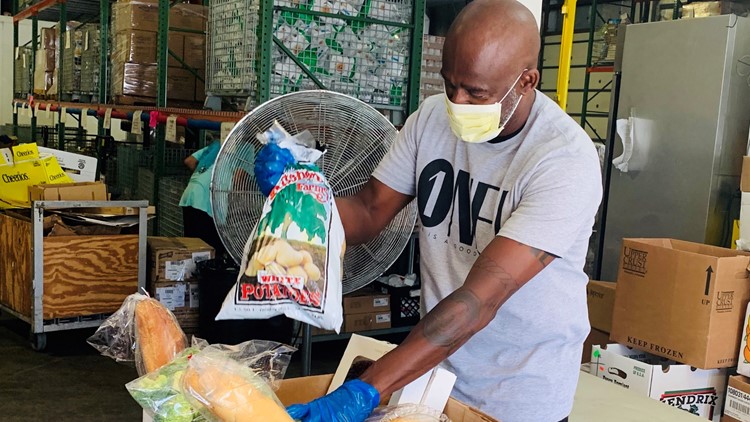TAMPA, Fla — Oct. 16 is World Food Day - recognizing efforts going on worldwide to end hunger. The coronavirus pandemic has simultaneously increased the number of people needing help finding food and decreased the number of people able to donate.
In Florida, the CEO of Feeding Tampa Bay Thomas Mantz says demand for help with groceries shot up 700 percent when the pandemic began in March. That number has dropped to 100 percent, but includes several families who are getting assistance for the first time. Many people are still in need though. Short term financial aid programs are ending, even though people are not back at work.
Connection to unemployment
Thursday’s report from the Labor Department shows the number of Americans applying for unemployment benefits rose last week by the most in two months, to 898,000, a historically high number. The latest data shows the economy is still roughly 10.7 million jobs short of recovering all the 22 million jobs that were lost when the pandemic struck in early spring.
The jump in numbers could also show people have used up their regular state benefits — which usually expire after six months — and have transitioned to extended benefit programs that last an additional three months. The extended aid programs were established by the financial aid package that Congress enacted in the spring.
Many employers still aren’t confident enough in their businesses or in their view of the economy to ramp up hiring or recall workers. Job postings had rebounded steadily over the summer, but hiring has slowed in the past two months.
Putting that into context in Florida, our state Department of Economic Opportunity (DEO) says it's processed more than 4 million unique reemployment assistance claims since the pandemic began.
How to get help with food
Out of work or not, families in Tampa Bay are financially stretched thin because of the pandemic. People are navigating things like working from home and remote learning while also taking extra precautions during everyday tasks like shopping to stay healthy.
Food banks say they're seeing an increase in first time recipients, but they believe myths could be keeping even more people who need help from asking for it.
For starters, there are no requirements apart from being in need. You don't need to show any bank statements or proof of unemployment. A food bank may still ask for personal information as a way of tracking who's they're helping -- but it's not to satisfy any conditions to get food.
Jayci Peters, Communications and Culture Officer with Feeding Tampa Bay says about 70% of the people they're helping now are using a food bank for the first time. She wants to remind people they're not alone.
"Feeding Tampa Bay is here to help. There's no judgment. There's no question, no requirement - all we need to know is you're in need," Peters said. "And we're going to help."
The organization has a questionnaire to help determine if you're eligible for long term food assistance as well as contact information for local organizations who can help you apply for benefits like WIC or SNAP. Feeding Tampa Bay's goal is to help people work toward long term solutions to be food secure.
If you can help, a little can go a long way. Feeding Tampa Bay says $1 is enough for them to provide 10 meals. You can learn more about the organizations efforts during the pandemic, sign up to volunteer or find your nearest food bank by clicking here.
Recently, the United Nations World Food Program won the Nobel Peace Prize for it's efforts to end hunger around the world. Part of those efforts also include sustainably getting rid of the food we don't eat and ending violent conflict worldwide.



